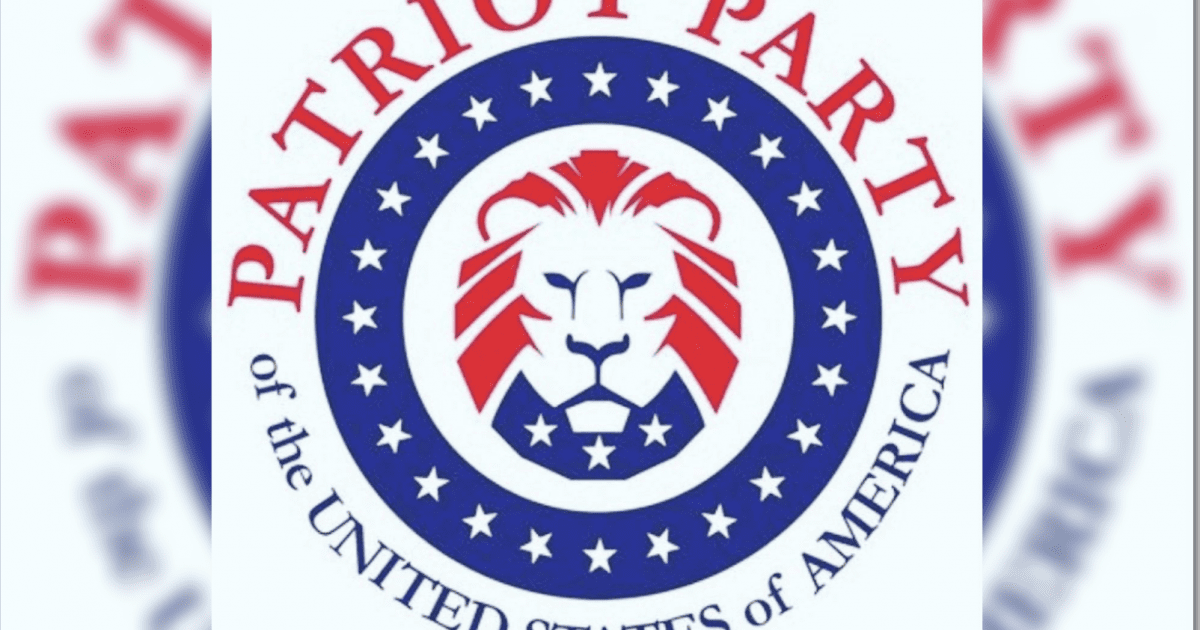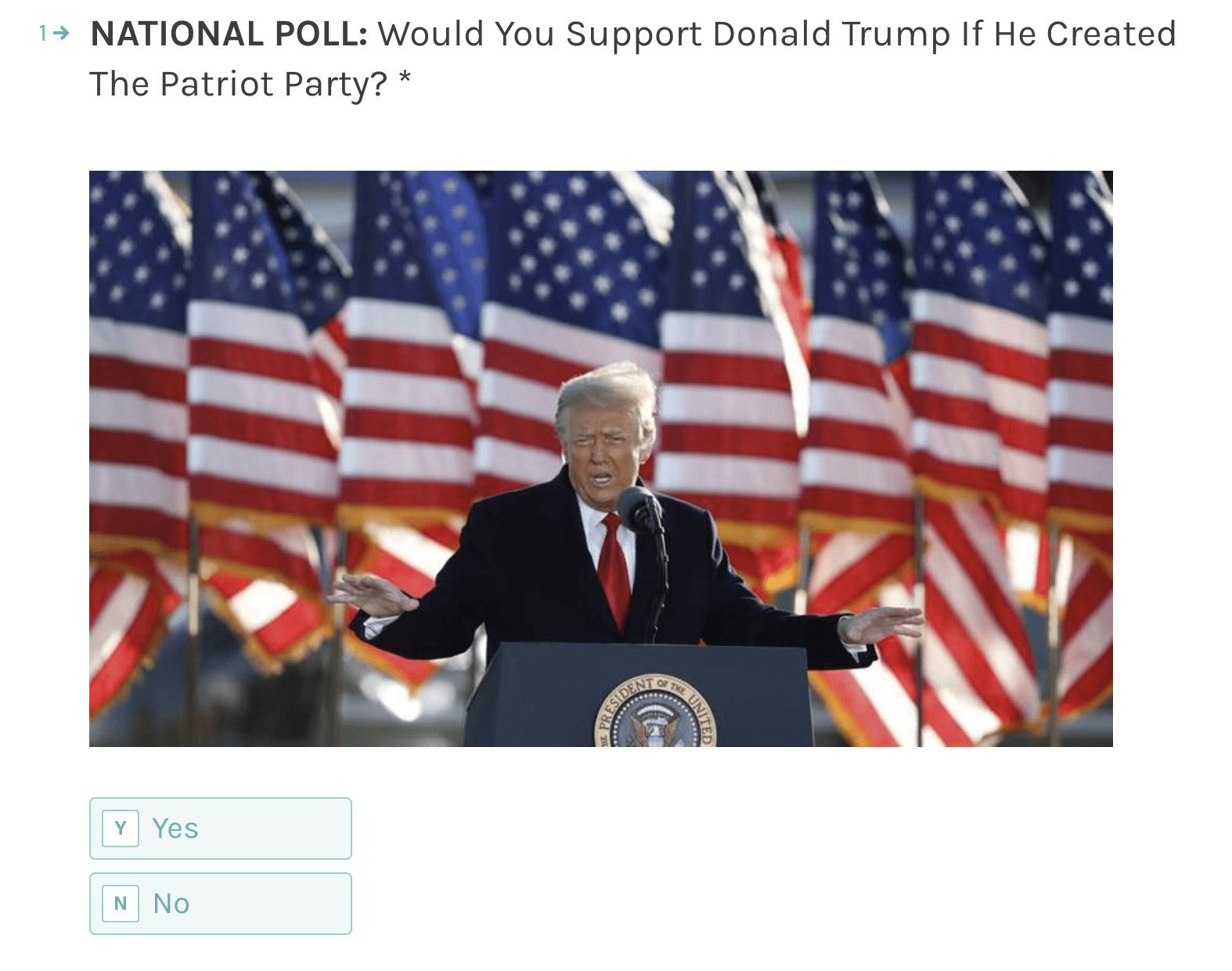The “Patriot Party” has a great ring to it, don’t you think?
Before we get too far into this article, I want to be really clear where I stand on this topic.
I am not one of the people saying it’s ok, we’ll just fight back and win in 2022 or 2024.
No, I believe the time is now.
And I STILL stand firm on the belief that the waters of the Red Sea will part and we will see a miracle bringing President Trump rightfully back into office….now, not later.
So when I talk about the Patriot Party, I’m talking about right now.
And perhaps after President Trump retakes office for a second term?
Would you like to see that happen?
I, for one, and DONE with the RINOs in the GOP.
Time to push them to the curb as far as I’m concerned.
We have 85 million America-loving true patriots in the country and that sounds like a good time to create the Patriot Party to me!
Watch the Republicans shrivel up and die after 85 million of us leave them in the dustbin of history.
You abandon Trump, you lose us!
Here’s what people are saying:
Whatever party Trump is – I am.
Welcome to the Patriot Party. There’s 75 million of us not going ANYWHERE! https://t.co/rGXby6h6n5
— Andrew Pollack (@AndrewPollackFL) January 20, 2021
If Trump makes a Patriot Party, I might run for office 👀
— Kaitlin Bennett (@KaitMarieox) January 20, 2021
Report: President Trump considers forming Patriot party – https://t.co/y9I8clpkKq #OANN pic.twitter.com/QBX44nL7Gu
— One America News (@OANN) January 21, 2021
From OANN:
President Trump appears to be keeping politics on the horizon with talks of forming his own political party.
On Tuesday, reports said the President discussed forming a so-called “Patriot party” with some of his top aides and supporters. Traditionally, third parties have failed to gain steam in challenging both the Democrat and Republican parties. However, due to his large base of supporters and the record number of people who voted for him in 2020, many believe President Trump has what it takes to carry on the movement.
According to Politico, he spent days calling his close advisors to ask what he needs to do to “stay part of the conversation.” In his ‘farewell address,’ the President hinted at his future political career by saying the ‘MAGA movement’ is only just beginning.
“As I conclude my term as the 45th President of the United States, I stand before you truly proud of what we have achieved together,” President Trump stated. “We did what we came here to do and so much more.”
The idea also came into play as some Republicans, including Mitch McConnell, broke with the President and placed blame on him for the January 6 attack on the U.S. Capitol.
However, recent polls showed the President still has strong support among voters and the GOP. While President Trump has not officially commented on the idea — and it remains unclear if and when the plan would come together — some have voiced concern the new party would draw voters away from the Republican party.
Nonetheless, President Trump remains committed to the American people.
Report: Trump considers starting new ‘Patriots Party’ for those ready to leave GOP
A report published Tuesday by the Wall Street Journal said Trump has discussed potentially creating a third party called the “patriot party.”
Do you want this to happen?https://t.co/K2qr0DTEDi
— Sara A. Carter (@SaraCarterDC) January 20, 2021
Donald Trump arrived back at his Mar-a-Lago resort amid speculation he would start a new “Patriot Party”. DETAILS > https://t.co/tWHFJvKrX9 pic.twitter.com/eAQ4t21O2E
— Herald Sun (@theheraldsun) January 20, 2021
Reason had some interesting thoughts:
“Goodbye. We love you. We will be back in some form,” Donald Trump said at the end of his final speech as president of the United States. “Have a good life. We will see you soon.”
But how soon? And in what form?
These questions prompted much speculative chatter Tuesday, after The Wall Street Journal published a short, anonymously sourced article stating that “Trump has talked in recent days with associates about forming a new political party,” to be named the Patriot Party.
If serious (always a critical “if” with Trump), the former president’s trial balloon has the potential to disrupt America’s two-party balance in the most significant way since the Kansas-Nebraska Act split the Whigs in 1854, helping give rise to the Republican Party.
If the 45th president takes his ball and goes home, he won’t be alone. While Trump’s public approval has consistently been the lowest of any modern president—and closed with a thud—it remains high among Republicans: 79 percent, according to a January 15–17 Morning Consult poll. His average GOP approval rating during the past four years was a record-tying 88 percent, per Gallup. (Among Democrats, it was a record-shattering low of 7 percent.) Until further notice, he remains the most popular figure in the party. A January 15–18 Civiqs poll showed that Trump voters, by a two-to-one margin, preferred characterizing themselves as “Trump supporters” rather than Republican Party supporters.
Sen. Rand Paul (R–Ky.) warned on Fox News last Friday that if GOP senators vote to convict Trump of impeachment, “it’ll destroy the party. A third of the Republicans will leave.” If so, that would likely include elected officials. Remember that just under half the GOP’s congressional delegation voted on January 6—even after the violent siege of their workplace—against certifying Joe Biden’s Electoral College victory, even though the theories behind their objections had been serially debunked, including by a number of Trump-appointed judges.
So the raw material for a Trumpian defection is there. But could he really do it? I see four main obstacles, beginning with the man himself:
1. It takes a lot of thankless, expensive drudgery without an immediate, flashy payoff. Not exactly what you’d expect from a leisure-loving 74-year-old corner-cutter who isn’t exactly known for his lengthy attention span.
“At the risk of understatement,” says Libertarian Party Chair Joe Bishop-Henchman, “starting a new political party is very hard. It requires a lot of money, a lot of work, a lot of volunteers. We’ll see, but it’s very difficult to do.”
Aside from the ballot-access hurdles (on which more below), there is an important fundraising bottleneck at the beginning of a new party’s life: The incumbents, including minor parties, that have “national committees” as recognized by the Federal Elections Commissions (FEC), are able to accept donations at $35,000 a pop. Individual campaigns along the lines of a prospective Trump 2024? Just $5,000.
And here’s the catch about graduating to the big boys’ fundraising club: The FEC won’t grant national committee status until a political party holds a national convention, establishes national headquarters, sets up state party committees, and has a “sufficient number of party-designated federal candidates on the ballot in a sufficient number of states in different geographic areas.” In other words, the Patriot Party better get cranking right now to compete in a whole bunch of 2022 House and Senate races; in the meantime, the candidates and the party will have to either self-finance (never a Trump specialty) or collect donations at a fraction of their competitors’ size for a minimum of two years.
“You almost have to through an election cycle before you get that qualification,” says Constitution Party Chair James Clymer, citing Ross Perot’s experience self-financing his independent run in 1992 before forming the Reform Party. “The first time around, unless you have somebody who’s willing to spend their own money in a big way, it makes it much more difficult to establish.”
Trump? Willing to spend his own money in a big way? On other people?
The Constitution Party, founded in 1990 as the U.S. Taxpayers Party, already has a national committee, and it was on the ballot last year in more states (17) than hip hop billionaire Kanye West. But the party’s ballot access, membership, and vote totals are all trending downward, and its 8th place 2020 presidential nominee, Don Blankenship, is more known for being the coal executive ex-con who coined the nickname “Cocaine Mitch” for Sen. Mitch McConnell (R–Ky.) than he is for competing against Joe Biden.
So it’s little wonder that the right-of-center, tough-on-immigration party is flirting openly with Trump’s not-quite-existent Patriots. “We would like to join forces with them, if that’s possible, one way or the other,” Clymer says. “I talked with some other people that are part of that, and…we’re exploring what possibilities there may be to work in some kind of alliance with them. But this is all very much in the preliminary stages.”
2. Americans are third-partiers in the streets, duopolists in the sheets. “Majority in U.S. Still Say a Third Party Is Needed,” went the headline over a Gallup poll in October 2018. Two weeks later in the midterm elections, third-party and independent candidates got smoked.
Pre-election polls persistently overcount third-party support by about a third, with many third-curious voters retreating to old habits in the polling booth. Over the past century, nontraditional presidential candidates have exceeded 15 percent of the vote—the minimum polling threshold to get into the duopoly-gatekept presidential debates—just twice: Progressive Robert La Follette’s 16.6 percent in 1924, and Perot’s 18.9 percent in 1992. Neither were within even 12 percentage points of second place.
The Trump political brand relies heavily on the concept of “winning.” He just lost by seven million votes nationwide—and if he bolts the GOP, he’ll split that coalition in two. Even given the unusual turbulence of contemporary politics, that does not seem like a formula for first place. Which would be hard for an ego that large to accept. But Trump wouldn’t be the only politician facing a gut-check.
Love to know what you think…..
Would you support the “Patriot Party”? 👇
NATIONAL POLL: Would You Support Donald Trump If He Created The Patriot Party?




Join the conversation!
Please share your thoughts about this article below. We value your opinions, and would love to see you add to the discussion!